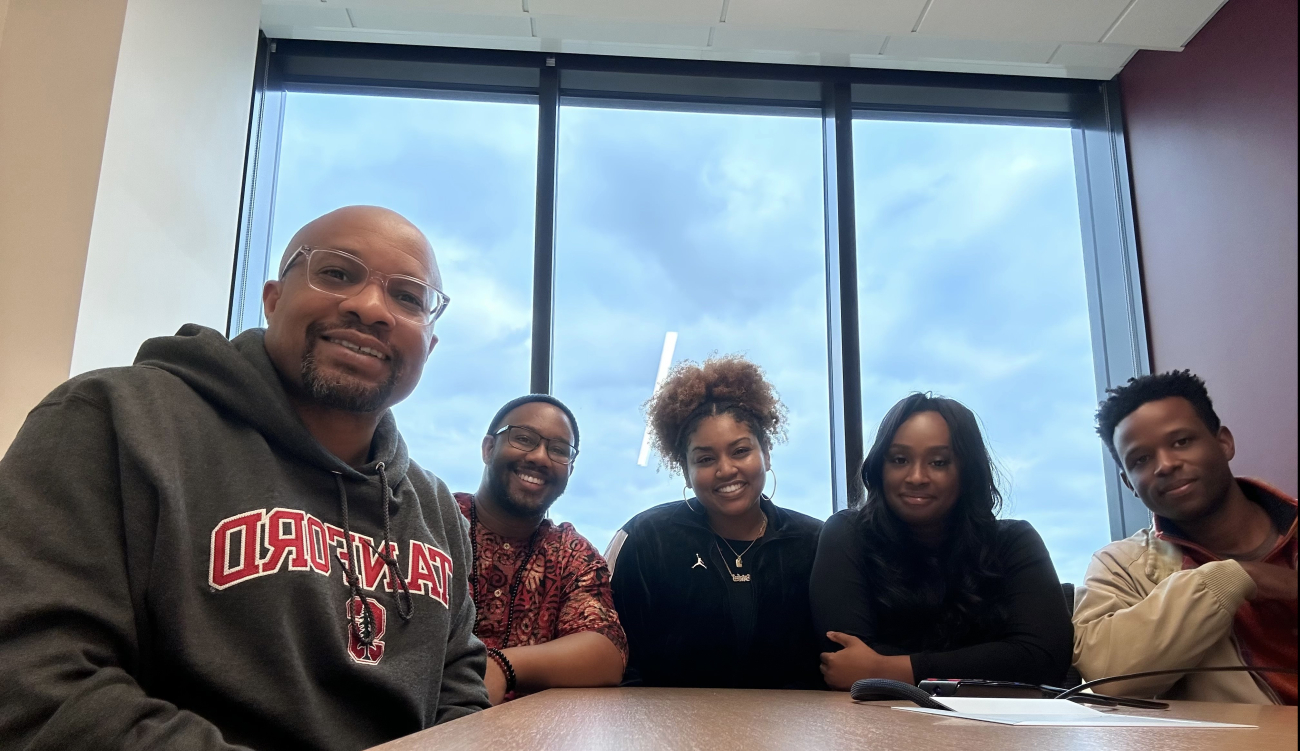
Stanford education scholars launch new academic journal focused on Black life, language, and culture
A new scholarly journal with a home base at Stanford is making its debut this fall, taking a unique approach to the study of Black life, language, and culture.
The Journal of Black Language and Culture (JBLAC) is the first publication of its kind to approach its theme through a multitude of disciplines, bridging research areas that are typically siloed in academia, the editors said.
“We’re challenging the traditional boundaries of language and culture research, with a focus that just isn’t found in other journals,” said Anne Charity Hudley, a professor and associate dean of educational affairs at Stanford Graduate School of Education (GSE), who serves as the journal’s lead editor. “There are journals that focus on linguistics or culture separately, but we’re offering a space where they’re fully interconnected – where language practices are centered as both a product and shaper of Black cultural life.”
The open-access, peer-reviewed journal will begin publishing in early 2026, with articles including an analysis of teacher survey data on African American language in STEM, an exploration of Black community identification at a historically white university, and a study of how Black linguistic and cultural practices can support communities affected by diabetes.
The journal will host a series of webinars beginning on Nov. 7, including guidance for submissions, applying to join the editorial board, and introductions to special themes for upcoming issues.
JBLAC is a project of the GSE’s Black Academic Development (BAD) Lab, a collective of scholars from universities across the country, led by Charity Hudley. The journal is published by Cambridge University Press in partnership with the Linguistic Society of America (LSA), making it one of four major journals sponsored by the LSA.

Anne Charity Hudley
Building on decades of research
Stanford is a fitting home for the journal, the editors said, given decades of scholarship on Black language and culture from faculty at the university such as Arnetha Ball, John Baugh, and John Rickford.
“So much research has come out of Stanford from these scholars and all the students they’ve worked with over the years,” Charity Hudley said. “But there wasn’t a journal specifically designed to address it. Early on we didn’t think there was enough work to necessarily sustain a journal, but we’ve had so many more people in this generation doing research in this area that it seemed like it was time.”
The launch of JBLAC also builds on last year’s departmentalization of the African and African American Studies program at Stanford.
“The journal is an enterprise that’s aligned with the goals of the institution to grow that space, and it gives our new department an anchor,” Charity Hudley said.
JBLAC fills a gap in the current landscape of academic journals, the editors said, by explicitly connecting the study of Black language practices with cultural life and identity. Other journals that publish work on African linguistics, for example, don’t often include the cultural specificities of Black life, they said, and those focused on Black culture and social structures frequently overlook the role that language plays.
The motivation to develop JBLAC grew largely out of experiences Charity Hudley and other scholars shared in submitting papers to journals focused on a discipline such as linguistics or anthropology, and being told the work was outside the scope of that publication. With JBLAC, the editors aim to mitigate those disciplinary boundaries and lift barriers that scholars of Black language and culture often face in publishing their work.
In addition to an editorial board providing primary oversight for the journal’s direction and focus, JBLAC has a board of senior advisors and reviewers representing a range of disciplines, including education, sociology, communication, and disability studies.
To help demystify the process of academic publishing for undergraduate and graduate students, the editors also established fellowship programs that get students involved in soliciting, reviewing, and editing submissions.
“A big theme of the BAD Lab is collaboration, and this project is collaborative in a way that’s not commonly done at academic journals,” said Mia Harris, social science researcher at the BAD Lab and managing editor of JBLAC. “These spaces have historically been closed to marginalized folks, and when it comes to how to navigate these frameworks of finding a journal that suits your work and getting published, we’ve been really intentional about educating as we go.”
Expanding the perception of linguistics
The editors plan to publish 20-24 articles a year on an ongoing basis as pieces are accepted. In addition to empirical studies and more theoretical articles considering existing research, the editorial team is interested in pieces written by and for students for classroom use (both K-12 and college level), and “how did you do that?” articles that share practical, behind-the-scenes insights into conducting Black language and culture research.
They identified a set of rubrics for evaluating submissions, including whether the ideas involve a scholarly area concerning both Black language and culture, how comprehensively the author considers the implications of the work for the lived experiences of Black people, and whether the work would be of interest to readers across disciplines.
Upcoming issues are slated to take on special themes, such as Black media, academic freedom, and the language and literacies of Africana spirituality.
The editors said they hope to expand the public understanding of what the field of linguistics can involve, and to encourage dialogue among scholars in linguistics and other fields that contribute to the study of Black language and culture.
“A lot of people are doing language and culture work without realizing it – they might be looking at rap music, or the way Black language is informing social and digital media, like Black Twitter,” said Harris. “Our hope is that JBLAC can be a space for folks who are doing this work in different corners to come together and have more of a community.”
In celebration of its launch, the journal will host a series of webinars beginning on Nov. 7, when the JBLAC editorial team will share an overview of the journal’s mission, scope, and goals. Learn more and register.

JBLAC managing editor Mia Harris, pictured here fourth from left, with (l-r) GSE doctoral student Kevin Anderson, a graduate fellow with JBLAC; Lionnell Smith, assistant editor of JBLAC; and Ericka Cannon and Jaylen PIttman, both GSE doctoral students and JBLAC graduate fellows. The editors established fellowship programs to build undergraduate and graduate students' involvement and help demystify the process of academic publishing.
Faculty mentioned in this article: Anne Harper Charity Hudley



